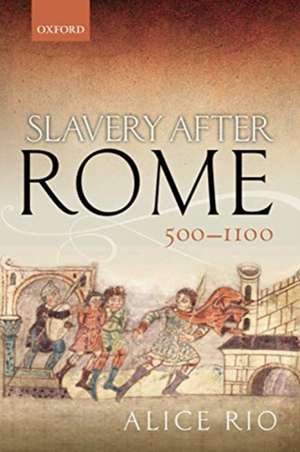Slavery After Rome, 500-1100: Oxford Studies in Medieval European History
Autor Alice Rioen Limba Engleză Paperback – 16 iun 2020
Din seria Oxford Studies in Medieval European History
- 30%
 Preț: 563.65 lei
Preț: 563.65 lei - 26%
 Preț: 599.49 lei
Preț: 599.49 lei -
 Preț: 317.61 lei
Preț: 317.61 lei - 26%
 Preț: 559.15 lei
Preț: 559.15 lei - 25%
 Preț: 509.93 lei
Preț: 509.93 lei - 12%
 Preț: 297.64 lei
Preț: 297.64 lei - 12%
 Preț: 194.68 lei
Preț: 194.68 lei - 30%
 Preț: 782.78 lei
Preț: 782.78 lei - 27%
 Preț: 541.20 lei
Preț: 541.20 lei - 30%
 Preț: 596.18 lei
Preț: 596.18 lei - 7%
 Preț: 197.15 lei
Preț: 197.15 lei - 30%
 Preț: 790.32 lei
Preț: 790.32 lei - 30%
 Preț: 672.55 lei
Preț: 672.55 lei - 30%
 Preț: 590.89 lei
Preț: 590.89 lei - 26%
 Preț: 670.93 lei
Preț: 670.93 lei - 17%
 Preț: 581.72 lei
Preț: 581.72 lei - 17%
 Preț: 581.63 lei
Preț: 581.63 lei - 17%
 Preț: 690.25 lei
Preț: 690.25 lei - 25%
 Preț: 692.55 lei
Preț: 692.55 lei - 30%
 Preț: 593.75 lei
Preț: 593.75 lei
Preț: 267.71 lei
Preț vechi: 314.24 lei
-15% Nou
Puncte Express: 402
Preț estimativ în valută:
51.23€ • 53.62$ • 42.64£
51.23€ • 53.62$ • 42.64£
Carte disponibilă
Livrare economică 26 februarie-04 martie
Preluare comenzi: 021 569.72.76
Specificații
ISBN-13: 9780198865810
ISBN-10: 0198865813
Pagini: 304
Dimensiuni: 155 x 232 x 17 mm
Greutate: 0.45 kg
Ediția:1
Editura: OUP OXFORD
Colecția OUP Oxford
Seria Oxford Studies in Medieval European History
Locul publicării:Oxford, United Kingdom
ISBN-10: 0198865813
Pagini: 304
Dimensiuni: 155 x 232 x 17 mm
Greutate: 0.45 kg
Ediția:1
Editura: OUP OXFORD
Colecția OUP Oxford
Seria Oxford Studies in Medieval European History
Locul publicării:Oxford, United Kingdom
Recenzii
Review from previous edition This excellent work provides a new lens for understanding the many varieties of early medieval unfreedom, and readers should welcome the clarity Rio has brought to this topic... Highly recommended.
Rio spends considerable ink offering critiques of key scholarship on medieval slavery. I used this book in a reading group I facilitated for graduate student women, and these extended analyses were extremely useful in thinking through the scholarly landscape on medieval slavery and, for a wider audience, modes of scholarly criticism ... [This book] is a good reminder, useful to scholars and students alike: law is not static, not in its formation or its implementation, and instead of reading law as something that shapes human behavior, we must recognize the ways in which human behavior shapes law's creation and utilization.
Slavery after Rome shows in great detail and with commendable sophistication the omnipresence of that institution, in its many faces, in the early Middle Ages in the west. Rio has produced a rich and courageous book that tackles in new and original ways an important historical topic, bringing to the table an impressive array of evidence and arguments concerned with the early medieval period.
Rio has done a splendid job of analysing an extremely intractable source base and providing an interpretation that, without in any way trying to smooth over the inconsistencies and messiness of the evidence, nevertheless makes sense. Her book forces us to rethink narratives regarding the importance of the slave trade for the early European economy ... She has done a tremendous service by giving us a new basis for discussion of one of those elements of social transformation. This study will be an indispensable addition to any and every library (and course bibliography) that includes early medieval history in its remit.
Rio spends considerable ink offering critiques of key scholarship on medieval slavery. I used this book in a reading group I facilitated for graduate student women, and these extended analyses were extremely useful in thinking through the scholarly landscape on medieval slavery and, for a wider audience, modes of scholarly criticism ... [This book] is a good reminder, useful to scholars and students alike: law is not static, not in its formation or its implementation, and instead of reading law as something that shapes human behavior, we must recognize the ways in which human behavior shapes law's creation and utilization.
Slavery after Rome shows in great detail and with commendable sophistication the omnipresence of that institution, in its many faces, in the early Middle Ages in the west. Rio has produced a rich and courageous book that tackles in new and original ways an important historical topic, bringing to the table an impressive array of evidence and arguments concerned with the early medieval period.
Rio has done a splendid job of analysing an extremely intractable source base and providing an interpretation that, without in any way trying to smooth over the inconsistencies and messiness of the evidence, nevertheless makes sense. Her book forces us to rethink narratives regarding the importance of the slave trade for the early European economy ... She has done a tremendous service by giving us a new basis for discussion of one of those elements of social transformation. This study will be an indispensable addition to any and every library (and course bibliography) that includes early medieval history in its remit.
Notă biografică
Alice Rio was Junior Research Fellow at New College, Oxford, and Osborn Fellow and College Lecturer at Sidney Sussex College, Cambridge, before joining the History department at King's College London in 2009. She is the author of Legal Practice and the Written Word in the Early Middle Ages (2009), which won the Royal Historical Society Gladstone Prize in 2010, as well as of a number of articles on law, legal practice, and unfreedom in the early middle ages.
